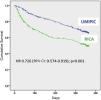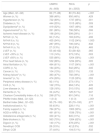Elderly patients with heart failure (HF) have a high degree of comorbidity which leads to fragmented care, with frequent hospitalizations and high mortality. This study evaluated the benefit of a comprehensive continuous care model (UMIPIC program) in elderly HF patients.
Methods and resultsWe prospectively analyzed data from the RICA registry on 2862 patients with HF treated in internal medicine departments. They were divided into two groups: one monitored in the UMIPIC program (UMIPIC group, n: 809) and another which received conventional care (RICA group, n: 2.053). We evaluated HF readmissions during 12 months of follow-up and total mortality after episodes of HF hospitalization. UMIPIC patients were older with higher rates of comorbidity and preserved ejection fraction than the RICA group. However, the UMIPIC group had a lower rate of HF readmissions (17% vs. 26%, p < .001) and mortality (16% vs. 27%, respectively; p < .001). In addition, we selected 370 propensity score-matched patients from each group and the differences in HF readmissions (15% UMIPIC vs. 30% RICA; hazard ratio [HR] = 0.44; 95% confidence interval [CI] 0.32−0.60; p < .001) and mortality (17% UMIPIC vs. 28% RICA; hazard ratio = 0.58; 95% CI 0.42–0.79; p = .001) were maintained.
ConclusionsThe implementation of the UMIPIC program, based on comprehensive continuous care of elderly patients with HF and high comorbidity, markedly reduce HF readmissions and total mortality.
Los pacientes ancianos con insuficiencia cardíaca (IC) presentan una elevada comorbilidad que conlleva una atención fragmentada, con frecuentes hospitalizaciones y alta mortalidad. En este estudio se evaluó el beneficio de un modelo asistencial caracterizado por una atención integral y continuada (programa UMIPIC), en pacientes con IC de edad avanzada.
Métodos y resultadosSe analizaron prospectivamente 2.862 pacientes con IC atendidos en servicios de Medicina Interna, procedentes del registro RICA. Se dividieron en 2 grupos: uno en seguimiento en el programa UMIPIC (grupo UMIPIC, n: 809) y otro atendido de forma convencional (grupo RICA, n: 2053). Se evaluaron los reingresos por IC durante 12 meses de seguimiento y la mortalidad total tras un episodio de hospitalización por IC. Los pacientes del grupo UMIPIC tuvieron más edad, comorbilidades y fracción de eyección preservada que los del grupo RICA. Sin embargo, el grupo UMIPIC tuvo una menor tasa de reingresos por IC (17 frente a 26%, p < 0,001) y de mortalidad (16 frente a 27%, respectivamente, p < 0,001). Se seleccionaron por emparejamiento (propensity score matching) 370 pacientes de cada grupo, manteniéndose las diferencias en reingresos por IC (15% UMIPIC frente a 30% RICA; hazard ratio [HR] = 0,44; intervalo de confianza del 95%: 0,32−0,60; p < 0,001) y mortalidad (17% UMIPIC frente a 28% RICA; hazard ratio = 0,58; intervalo de confianza del 95%: 0,42–0,79; p = 0,001).
ConclusionesLa implantación del programa UMIPIC, basado en una atención integral y continuada a pacientes ancianos con IC y elevada comorbilidad, disminuye significativamente los reingresos por IC y la mortalidad total.
Article
Diríjase desde aquí a la web de la >>>FESEMI<<< e inicie sesión mediante el formulario que se encuentra en la barra superior, pulsando sobre el candado.

Una vez autentificado, en la misma web de FESEMI, en el menú superior, elija la opción deseada.

>>>FESEMI<<<












